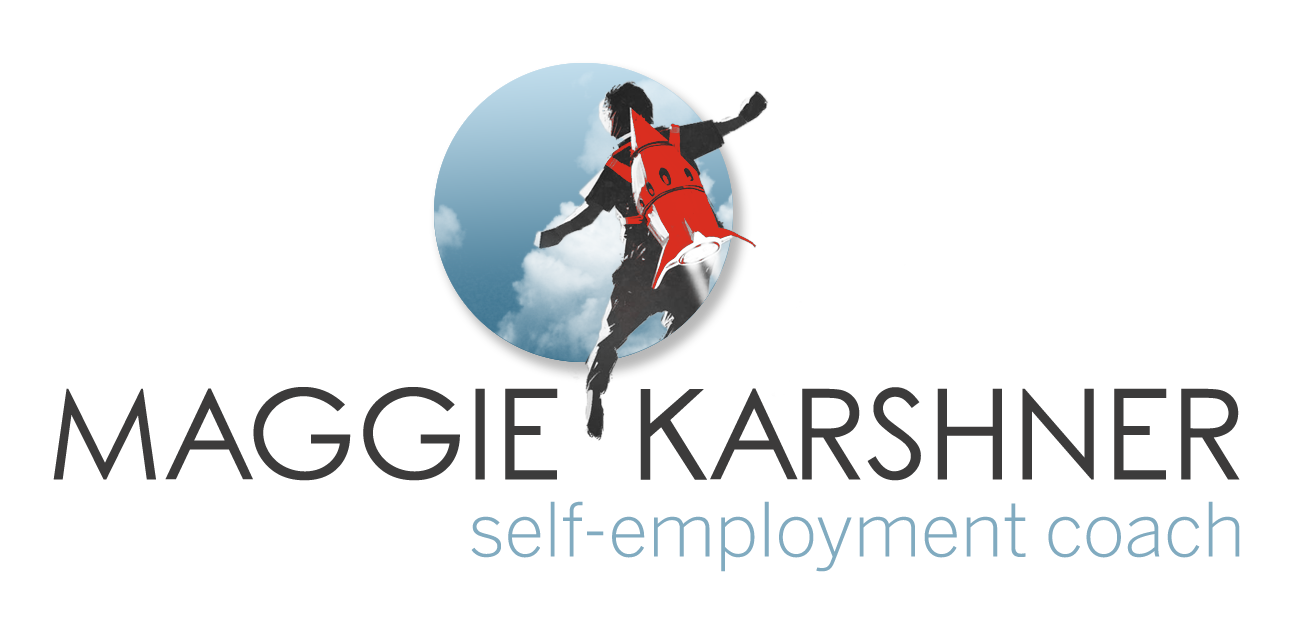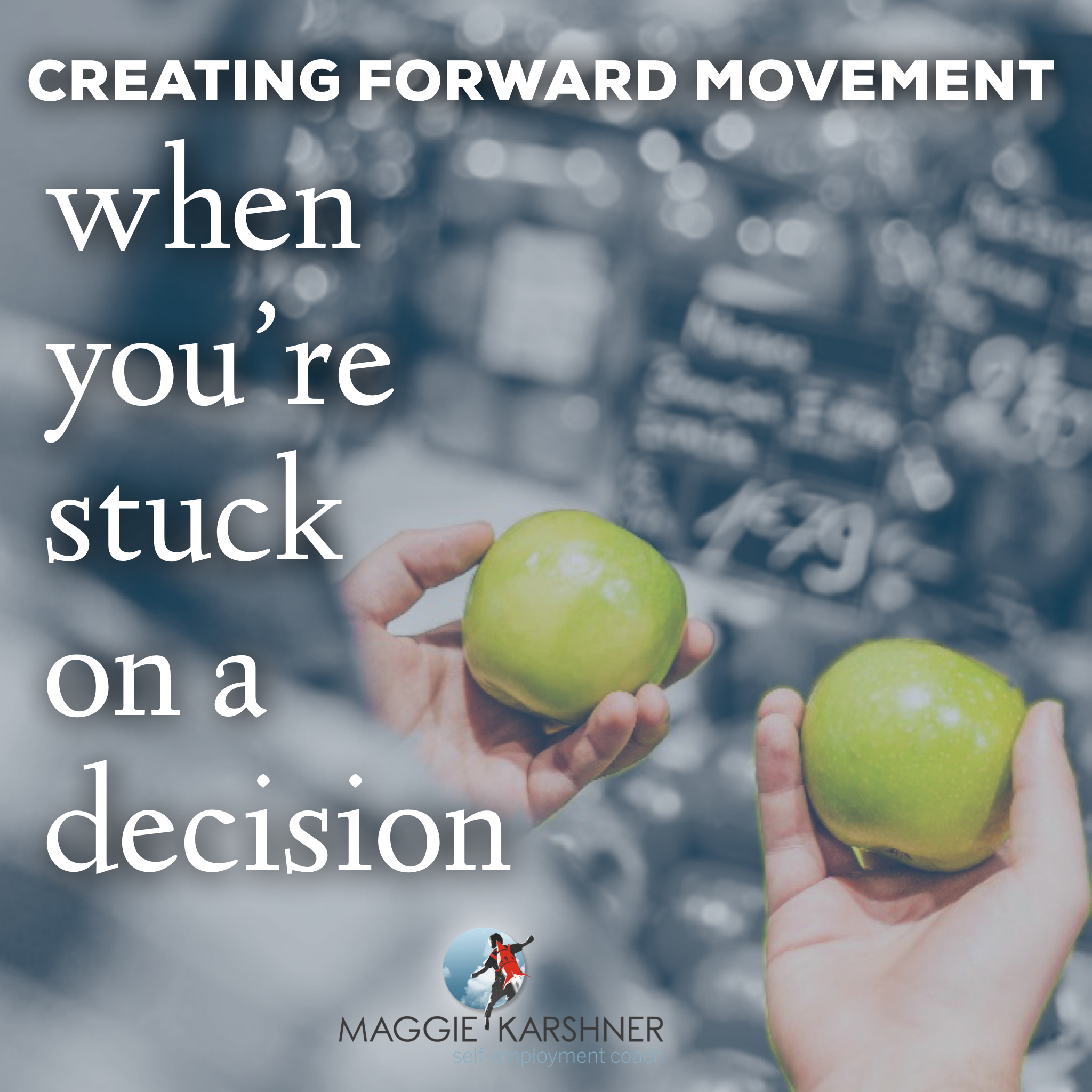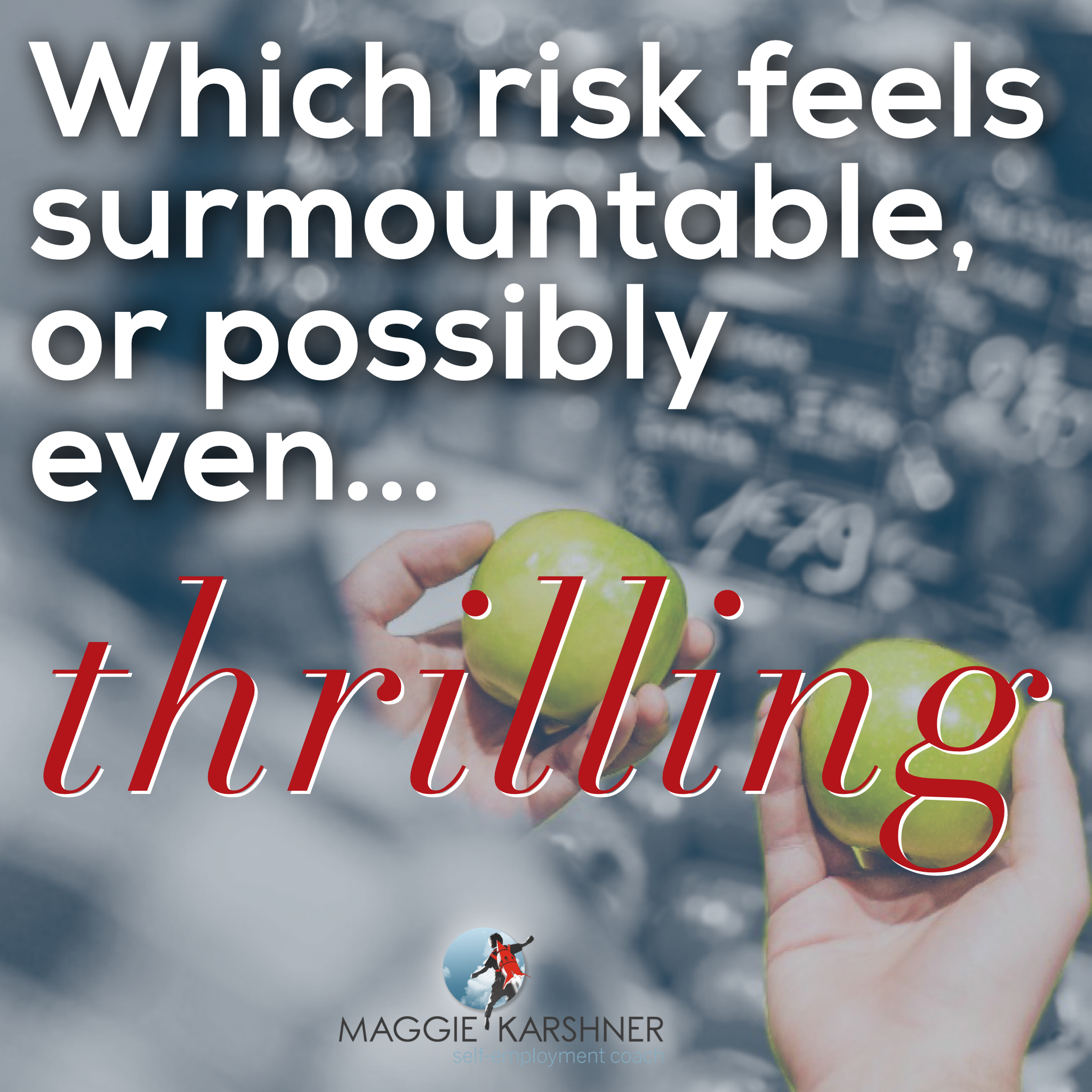Creating Forward Movement - When You're Stuck on a Decision
/Forward movement is important for all businesses, but it's especially important for self-employed business owners since we don't have a boss or co-workers to push us along. In my previous article, I talked about creating forward movement when you're stuck at the start, but that's only one of the ways we get stuck. It's also very common to get stuck when faced with a decision.
Putting off a decision can mean a valuable opportunity passes you by, or that an important thing just never gets done. Procrastinating key decisions can result in stagnation in your business and loss of revenue, where as making poor decisions can hurt your business just as much. It's vital to not only make decisions, but make good decisions. In my work I notice that the desire to make good decisions often results in no decision happening at all. No matter where you are in your journey towards self-employment (or in any part of life) it can be helpful to learn how to make decisions effectively. Don't let your business (or life!) suffer simply because a decision is looming. Here are some strategies for facing that decision and getting unstuck.
Stuck on a Decision
So here's the situation: you could do A... or B... or C.... or maybe put off that decision until it's no longer relevant (aka "D - none of the above.") These options all seem equally valid, and it's just not clear which one you should move forward with. It's clear this is a decision, but it's not clear which option to choose.
There are many decision making tools - pro-con lists, flipping a coin, etc. - but they have a common shortcoming: the human tendency towards decision paralysis. You can make all the pro-con lists you want, but if you don't feel resolved in your decision, you won't move forward. I notice that there are five things that are commonly the source of decision paralysis:
- perfectionism
- fear
- aversion to risk
- lack of trust in self & future ability to adapt
- feeling rushed or not feeling rushed enough
Let's look at each to see what might be getting in your way.
Perfectionism
A really common reason people don't make a decision is because they're caught up on making "the best" decision, that has the best possible outcome with an absence of risk. While you want to put proper care and consideration into a decision, the perfectionism that drives this desire for "the best" decision is counterproductive. As a self-employed business owner, you can't afford to spend hours of your time considering and reconsidering. You need to think it through, gather what information is at hand, choose the best possible option, and then move on to the next thing. It's about making the "good enough" decision, because the true "best" decision is to decide to not be stuck in indecision!
Fear
Big decisions often have an aura of fear around them. We get thinking about all the "what ifs" (a necessary part of the decision making process) and then the fear kicks in. As I mention in the conclusion of an older article titled "Courage, Fear, and Life (and Entrepreneurship)" "[Fear is] an indicator that something is worth doing." Fear is telling you this decision feels important. So the question is: how do you tell fear, "Thanks for the update, you can stop screaming about how important this is!"? The strategy is much the same as I laid out in that previous article. Break down the decision into baby steps and get over-informed about all the components of the decision. When fearful feelings come up, identify what of it is anxiety-fear (e.g. this decision *might* destroy my business) vs fear-fear (e.g. my life is in danger). It probably isn't the latter. Anxiety-fear is uncomfortable, but it passes. Reframe this decision in the larger scale of life (e.g. will this *destroy* the business or merely *hurt* it.), remember all the challenging decisions you've made in the past that worked out fine, and be sure to give yourself plenty of pep-talks!
And keep in mind: there's no such thing as a "poor" decision. You considered your options and made the best possible decision. Don't get stuck on the decision merely because you're afraid of a possible outcome.
Aversion to Risk
While there are many different fears, there is one specific one that all entrepreneurs face: our natural aversion to risk. Decisions often bring up a sense of risk. In business it's often the risk of depriving the business and diminishing growth potential. Or, as our fears might catastrophize it: the business might FAIL! While working on fears in general, it can also be helpful to reframe how we think about risk specifically.
No part of life is risk-free. Even doing nothing has a risk. While, it's natural to feel aversion to these risks, what if, rather than avoiding risk (which is essentially impossible!) what if you chose the risk you *wanted*? Which risk feels surmountable, or possibly even... thrilling? Indecision is the true enemy here, so throw aside adages like "with great risk come great reward" and try making a decision based on which risk sounds more fun.
Building Trust in Yourself
When facing fears and risk, I find great comfort in the trust I have in myself. This trust is not something I have by magic, rather it's something I work to cultivate. The basic idea here is that if you have trust in yourself, then you trust that if the decision you make doesn't work out, you'll still land on your feet. You'll adjust, you'll call upon your resources, and things will work out. It might be stressful, but it won't be insurmountable.
Cultivating this trust is not a quick or easy task. You can start by drawing from things in your past. Think of times when things didn't go ideally, but were also not a complete catastrophe. Were there things you did that helped it not become a catastrophe? What resources did you draw on (internal to yourself, or friends/colleagues, etc.) that helped turn things around? What did you learn from that experience that you have (or will) use to improve future situations?
When you've found some examples of this in your past, you'll start to become aware of them in the present as they're happening. If you find yourself in a state of worry, you can remember a past similar situation and how it was not *the worst* outcome or how you were able to turn things around. If things have legitimately gone sideways, you might remember some resource you used before, that you can draw on now. And in the absolute worst case scenario, you can remember that you'll learn from this, as you have so many other times before.
With any decision, abandon your desire to get the "right answer" and instead seek what you can learn from this experience. It takes practice to build trust in yourself so that “failure” stops being a fear and starts being a learning opportunity. What you can learn from any decision is how to further trust yourself regardless of the outcome. Sometimes we don't take the direct path, and that's ok! Life isn't about the destination, it's the journey, right? So don't wish pieces of your journey away. Embrace it and learn from it.
Rush vs. Timeliness
Decisions that feel like they must be completed in a rush are some of the most uncomfortable. They tend to come prepackaged with stress and anxiety. And, we tend to not get permanently stuck in a state of decision paralysis because that deadline is going to come due and something is going to happen.
Some of the most difficult decisions are the ones that *don't* have a deadline. A deadline is very clear cut and either you achieved it or you didn't. A decision that doesn't have a deadline is likely to be put aside to linger until the passage of time makes the decision for you. And that's no way to be a proactive participant in your life, and isn't a great strategy for running a business either!
When faced with a decision that could happen whenever you get around to it, try making a plan to engage with the decision on a regular basis. Block out a specific amount of time on a specific date to make a pro/con list. Then put it on a shelf, but set a reminder to re-examine it. Set another reminder and flip a coin to make the decision, then see how you feel about that result. Compare it to how you feel about the pro/con list. Is there information you need to gather to inform your decision? Make a plan to acquire it. Rinse and repeat.
In this way you can be in process with the decision and it's more likely that you'll come to an understanding of the factors at play (not just the details about the decision options, but also about your internal world surrounding this decision) and that awareness will lead to clarity about which option to choose. Repeatedly engaging with your decision is also likely to desensitize you to the fear and risk involved. This means you're likely to get bored of this decision and finally just make the decision so you can stop revisiting this topic. It might seem a little ridiculous, but if it means you make the decision, then it worked!
Beat Decision Paralysis
Every decision is different and the way of tackling any given decision needs to be appropriate to the specific situation. I hope the perspective I've shared here will help you more appropriately choose your process for tackling tough decisions. Developing your skill at creating forward movement can lead to fruitful returns. In my case, I was stuck on a blog article for a month, but in the end I've ended up with two stellar blog articles that nearly wrote themselves (just, not on the original time-table!)
These were my thoughts on getting unstuck. What are the other ways you get stuck? Share in the comments below and maybe I'll write my next blog article talking about how to get unstuck in one of those situations!





